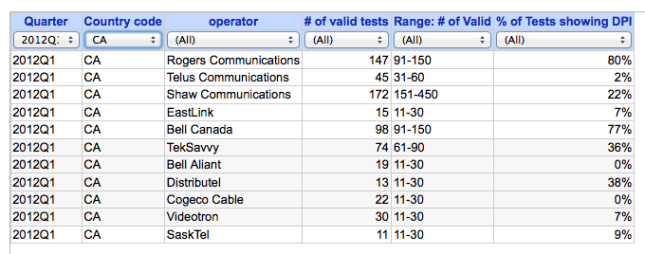We couldn’t have a week of broadband fun here on the blog without talking about that old favourite topic: throttling. You know, what internet providers do to online services and applications they don’t like, and/or that may compete with things they sell.
A group of researchers from around the globe have been using M-Labs, a tool set up by Google, for a while now to keep tabs on internet service providers and their throttling. Back in October of last year, they found that since 2008, Rogers had been the worst ISP in the world when it came to slowing down customers’ connections.
In February, the cable company promised to phase out throttling by the end of this year, with about half of all customers to see results starting in June.
The latest quarterly M-Labs results set a pretty good baseline against which to compare throughout the rest of the year, to see if Rogers is being true to its word. As the pic below shows, about 80% of tested Rogers connections were throttled as of March, 2012. Only one ISP in the world - J:Com in Japan - scored higher. But with a far smaller sampling of tests, the result is less accurate than that for Rogers. Interestingly, despite that promise, the 80% result for Rogers is a small, 1% uptick from the fourth quarter of 2011.
Perhaps the more interesting result, however, is from Bell, which was found to be throttling 77% of connections in the first quarter of 2012. Not only is that good enough for the global silver medal to Rogers’ gold, it’s also a 5% increase from the previous quarter.
That’s a strange result in light of a December letter to the CRTC, where Bell said it would “will withdraw the shaping of P2P traffic on the companies’ networks, with regards to both retail and wholesale traffic, effective 1 March 2012.”
Collectively, these are also strange results given the net neutrality rules established by the regulator in 2009, which stated that throttling should only be used as a last-ditch effort to manage network congestion. As the M-Labs researchers put it in their specific notes on Canada:
The data pattern for Canada is interesting because it shows that BitTorrent throttling by Bell Canada actually increases substantially in late 2010 and 2011, after a 2009 CRTC decision regulating Internet Traffic Management Practices… Bell Canada and Rogers were both among the world’s top 10 throttlers in 2011 and 2012… As of the 1st of March 2012 there is no sign of any change.
Neither Bell nor Rogers has broken their promises regarding the end of throttling yet, but the deadline is now official. Three months from now, when the researchers release their next set of quarterly findings, we’ll be able to see if the two companies are being true to their word. With the trend lines going in the wrong direction, it’s fair to be skeptical as to whether they’ll actually keep those promises.


Simon
August 17, 2012 at 11:57 am
I’m confused. DPI stands for Deep Packet Inspection, a process that is connected to but not synonymous with throttling. So when an ISP is showing a high rate of DPI, how do we know that this equates to the same rate of throttling?
petenowak2000
August 17, 2012 at 1:00 pm
Sorry, should have been clearer: the researchers were using a specific test that relates to BitTorrent called Glasnost. More info here: http://dpi.ischool.syr.edu/MLab-Data.html
russellmcormond
August 23, 2012 at 1:04 pm
There are other relationships: The equipment that does DPI is itself a bottleneck in the network, often creates its own congestion, and thus potentially requires throttling to solve.
Using DPI to solve bandwidth problems that didn’t already exist only creates them.
Nicolas @ Rogers (@RogersNicolas)
August 17, 2012 at 12:01 pm
Hi,
I’m Nicolas from Rogers Social Media team.
We’ve been managing some P2P file sharing traffic on the upstream to ensure the best possible experience for all our customers, but new technologies and important investment enabled us to start phasing out our Internet Traffic Management Policy (ITMP) on March 1st, 2012.
Customers can get an update regarding the removal of this policy in their area here:
http://promo.orderrogers.ca/trafficmanagement/en/?cm_mmc=Redirects-_-Consumer_Traffic_ENG-_-Traffic_2012-_-traffic
Nicolas
@RogersNicolas
justin
August 22, 2012 at 12:27 pm
What sort of new technology are you referring to? You realize that simply removing your throttling system would remove it right? Rogers added an extra layer throttling, you usually don’t have to invest and acquire new technology to remove something.
themediamentor
August 22, 2012 at 12:08 pm
Reblogged this on The MediaMentor's WordPress Blog and commented:
There’s talk of Bell Canada.. so does that included Northwestel?
Lance Campeau
August 23, 2012 at 9:02 pm
Good read… looking forward to the results of the next quarter… my prediction? Business-as-usual for both Bell and Rogers. Never dealt with with Rogers but Bell’s self-preservational business tactics set the high water mark for corporate greed. This company is an embarrassment to Canadians. How they react to customer complaints one of the most enlightening things I have ever witnessed. This company takes cheap to a level preserved for PhD’s of corporate psychology.
A truly sickening display.